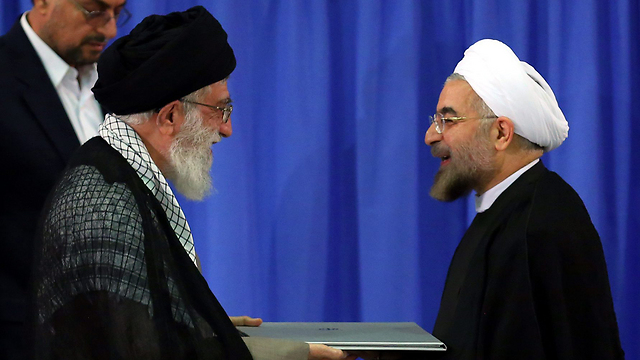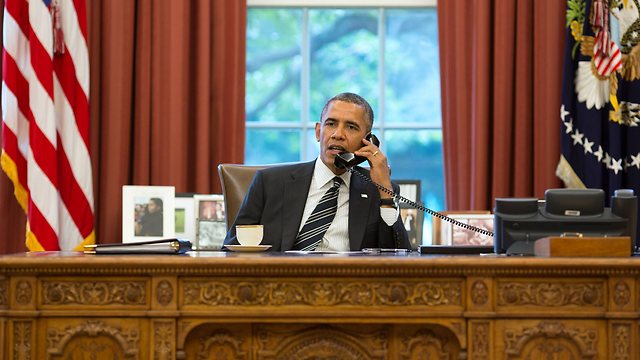Iran's Supreme Leader Ayatollah Seyyed Ali Khamenei has expressed support for the diplomatic approach of President Hassan Rohani’s administration, the Iranian PressTV reported.
"While we are optimistic about our government's diplomatic staff, we are pessimistic about the Americans. The US government is not trustworthy, is self-important, and breaks its promises," Khamenei said, adding that it is controlled by an "international Zionist network."
Related stories:
- Iran thaw warms Western oil company interest
- Biden: Nuclear Iran dangerous to Israel
- Iranian FM: Israel can't kill all our scientists
"We support the government's diplomatic movements and place importance on diplomatic efforts, and support what was in this last trip," Khamenei said in a speech, according to the ISNA news agency.
Khamenei and Rohani (Photo: EPA)
Obama speaks with Rohani from the Oval Office (Photo: MCT)
"Of course, in our opinion some of what occurred in the New York trip was not fitting," Khamenei said, without elaborating. His criticism was possibly directed toward Rohani's phone call with US President Barack Obama, the first such communication between the two countries' leaders.
A diplomat based in Tehran said Khamenei's comments were likely an effort to play down expectations from negotiations, while distancing himself from any failure in talks.
"There have already been sceptical signs and in a way these comments are not that surprising," the diplomat said, speaking on condition of anonymity. "The distance between Iran and the United States is very wide. It can't just turn into smiles and friendliness. He (Khamenei) is giving it a chance, but if it doesn't work he'll go back to his own way."
Dissenting voices
One of Khamenei's close advisors, Hamid Raza Taragi, said recently that "we need to get something from the Americans, before we smile at them. Of course, Mr. Rohani must convince some people at home that he is not making any radical steps."
Revolutionary Guard Commander Mohamed Ali Jafari was critical of the Obama-Rohani phone call, and said that though "the president took a firm and appropriate position during his stay, just as he refused to meet Obama, he should also have refused to speak with him on the telephone and should have waited for concrete action by the United States."
However, the conservative-controlled Iranian parliament strongly endorsed Rohani's attempt at a détente with the US. According to the Iranian news agency Fars, affiliated with the regime, 230 parliamentarians, out of the total of 290, signed a statement expressing their support of Rohani for presenting the image of a "powerful and peace-seeking Iran which seeks talks and interaction for the settlement of regional and international issues."
Rohani himself claimed during a press conference in New York that his government has full support for reaching a deal on the nuclear issue.
Reuters contributed to this report
- Receive Ynetnews updates
directly to your desktop

















